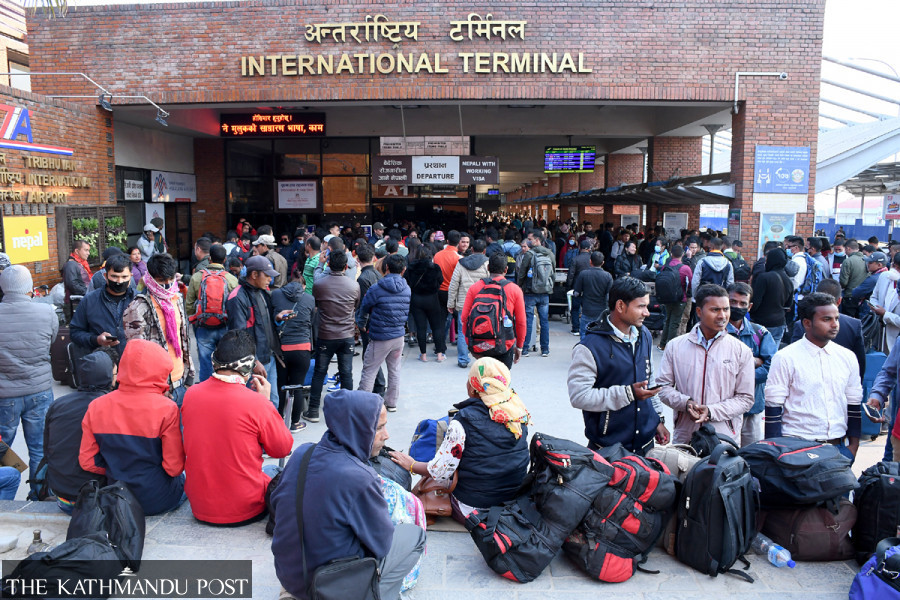National
For Israeli job, a Nepali worker needs to invest around Rs165,700
A labour deal already under criticism for making workers pay has put an additional financial burden on Israel job aspirants, labour migration experts say.
Chandan Kumar Mandal
The Nepal government has recently announced vacancies for people going to Israel for caregiver jobs. However, aspiring migrant workers selected for the jobs will be required to shell out large amounts of money and bear all the expenses to get to Israel.
As per the notice issued by the Department of Foreign Employment, the central government agency overseeing the labour migration sector, a Nepali worker will have to spend an estimated Rs165,700 once they have been selected for the job in Israel.
The worker has to bear all their expenses, including airfare, health insurance, pre-departure training, and medical examination, among others.
“This is far too expensive for migrant workers,” Anurag Devkota, a human rights lawyer who specialises in migrants rights, told the Post. “The amount that workers are made to pay for Israeli jobs is probably the most expensive one.”
The Labour Migration Report, 2020 of the Ministry of Labour, Employment and Social Security has mentioned recruitment costs prescribed by the government of Nepal for various labour destination countries.
As per the report, Nepali workers going to Malaysia, Jordan, Mauritius and the United Arab Emirates do not have to pay for anything as per recent agreements. Likewise, those migrating to the Gulf countries, Sweden and Malta must pay a maximum of Rs10,000 as a service charge to their recruiting agencies.
For other countries like Singapore and Panama, workers have to pay Rs 50,000. The cost for labour migration to South Korea is stipulated at $970, followed by Portugal (Rs65,000), Poland (Rs80,400) and Russia (Rs80,000).
Of the total Rs165,700 required from Israel-bound workers, Rs140,000 will be spent on a one-way flight from Nepal to Israel; Rs5,000 on health insurance package; Rs700 on pre-departure orientation training; Rs5,000 on passport; Rs10,000 on medical examination; Rs2,500 for the Covid-19 PCR test, and Rs1500-2500 as contribution to the Foreign Employment Welfare Fund.
“These are estimated maximum amounts which can fluctuate depending on the airfare,” Krishna Prasad Dawadi, director general at the Department of Foreign Employment, told the Post.
Nearly 10 months after the signing of an understanding between the two countries, which opened the doors for Nepali nurses to work in hospitals, nursing homes and daycare centres in Israel, demands for 1,000 Nepali workers have come this week.
Earlier, only 500 Nepali workers were set to be hired under the first phase of the job scheme. As per the vacancy announcement, a Nepali worker would be paid a monthly salary of $1,600 (equivalent to Rs190,232).
The deal at the time was praised for being under the government-to-government modality that excludes third parties or recruiting agencies, minimising potential malpractices.
However, the decision to make workers pay for the job in Israel has received criticism and scrutiny from Nepali migrant rights activists and experts. They pointed out that the decision contradicted the Nepal government’s policy of securing zero-cost jobs for its citizens. It also goes against the ‘Free Visa Free Ticket’ policy and the general principles and operational guidelines for fair recruitment of the International Labour Organisation.
“Any fee or economic burden on workers is unacceptable. The government’s failure to negotiate the basics as such is evidence of power asymmetries and weak migration diplomacy from our side,” said Devkota, who is also associated with the Law and Policy Forum for Social Justice, a Kathmandu-based organisation that works on migrant rights issues. “The international norms around labour migration suggest zero recruitment cost with the employer paying the principal.”
Soon after signing the agreement to send Nepali workers to Israel, Nepali officials had gone on the record to say that the total cost for each worker to reach Israel would stay around Rs80,000 and not cross Rs 100,000.
“These are not recruitment fees as such. But these payments include their airfare and pre-departure services,” said Dawadi, the director-general at the Department of Foreign Employment. “We are simply implementing the deal signed between the two countries.”
A recent study on Nepali workers’ migration to Qatar and Kuwait found out that Nepali workers were still paying hefty amounts to reach those labour-destination countries despite the Nepal government’s initiatives for making employers pay on behalf of workers. The study, which human rights lawyer Devkota was also part of, called on the Nepal government to declare such fees illegal and eliminate any fees and costs that are imposed on Nepali workers.
With the opening of online applications for caregiver jobs in Israel, Nepali aspirant workers have started rushing to file their candidacy. According to the department’s record, hundreds of people have already applied for the jobs.
But migrant rights activists say that such inconsistency in recruitment fees and costs would hurt a labour source country like Nepal and thousands of Nepali job seekers who go abroad for employment every year.
“While many studies recommend government-to-government recruitment as a recourse to controlling malpractices, these sorts of practices will only take us back to square one,” said Devkota. “Far from sticking to the commitment and institutionalising and implementing the policy, the government’s decision to make workers pay is a very counterproductive approach.”




 22.65°C Kathmandu
22.65°C Kathmandu













